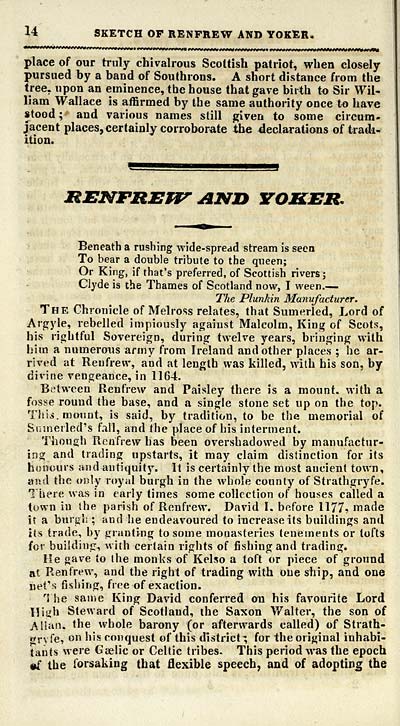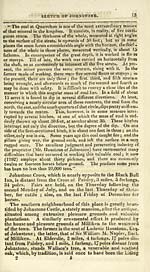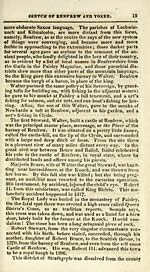Counties > Renfrewshire > 1832-1833 - Historical and descriptive sketches of the towns and principal villages in the Upper Ward of Renfrewshire
(26)
Download files
Complete book:
Individual page:
Thumbnail gallery: Grid view | List view

14 SKETCH OP RENFREW AND YOKER.
place of our truly chivalrous Scottish patriot, when closely-
pursued by a band of Southrons. A short distance from the
tree, upon an eminence, the house that gave birth to Sir Wil-
liam Wallace is affirmed by the same authority once to have
stood; and various names still given to some circum-
jacent places, certainly corroborate the declarations of tradi-
ition.
RENFREW AND YOKER
Beneath a rushing wide-spread stream is seen
To bear a double tribute to the queen;
Or King, if that's preferred, of Scottish rivers;
Clyde is the Thames of Scotland now, I ween. —
The Plunkin Manufacturer.
The Chronicle of Melross relates, that Sumerled, Lord of
Argyle, rebelled impiously against Malcolm, King of Scots,
his rightful Sovereign, during twelve years, bringing with
him a numerous army from Ireland and other places ; he ar-
rived at Renfrew, and at length was killed, with his son, by
divine vengeance, in 1164.
Between Renfrew and Paisley there is a mount, with a
fosse round the base, and a single stone set up on the top.
This, mount, is said, by tradition, to be the memorial of
Sumerled's fall, and the place of his interment.
Though Renfrew has been overshadowed by manufactur-
ing and trading upstarts, it may claim distinction for its
honours and antiquity. It is certainly the most ancient town,
and the only royal burgh in the whole county of Strathgryfe.
There was in early times some collection of houses called a
town in the parish of Renfrew. David I. before 1177? made
it a burgh ; and he eudeavoured to increase its buildings and
its trade, by granting to some monasteries tenements or tofts
for building, with certain rights of fishing and trading.
He gave to the monks of Kelso a toft or piece of ground
at Renfrew, and the right of trading with one ship, and one
net's fishing, free of exaction.
The same King David conferred on his favourite Lord
Hiuh Steward of Scotland, the Saxon Walter, the son of
Allan, the whole barony (or afterwards called) of Strath-
gryfe, on his conquest of this district ; for the original inhabi-
tants were Gaelic or Celtic tribes. This period w r as the epoch
•f the forsaking that flexible speech, and of adopting the
place of our truly chivalrous Scottish patriot, when closely-
pursued by a band of Southrons. A short distance from the
tree, upon an eminence, the house that gave birth to Sir Wil-
liam Wallace is affirmed by the same authority once to have
stood; and various names still given to some circum-
jacent places, certainly corroborate the declarations of tradi-
ition.
RENFREW AND YOKER
Beneath a rushing wide-spread stream is seen
To bear a double tribute to the queen;
Or King, if that's preferred, of Scottish rivers;
Clyde is the Thames of Scotland now, I ween. —
The Plunkin Manufacturer.
The Chronicle of Melross relates, that Sumerled, Lord of
Argyle, rebelled impiously against Malcolm, King of Scots,
his rightful Sovereign, during twelve years, bringing with
him a numerous army from Ireland and other places ; he ar-
rived at Renfrew, and at length was killed, with his son, by
divine vengeance, in 1164.
Between Renfrew and Paisley there is a mount, with a
fosse round the base, and a single stone set up on the top.
This, mount, is said, by tradition, to be the memorial of
Sumerled's fall, and the place of his interment.
Though Renfrew has been overshadowed by manufactur-
ing and trading upstarts, it may claim distinction for its
honours and antiquity. It is certainly the most ancient town,
and the only royal burgh in the whole county of Strathgryfe.
There was in early times some collection of houses called a
town in the parish of Renfrew. David I. before 1177? made
it a burgh ; and he eudeavoured to increase its buildings and
its trade, by granting to some monasteries tenements or tofts
for building, with certain rights of fishing and trading.
He gave to the monks of Kelso a toft or piece of ground
at Renfrew, and the right of trading with one ship, and one
net's fishing, free of exaction.
The same King David conferred on his favourite Lord
Hiuh Steward of Scotland, the Saxon Walter, the son of
Allan, the whole barony (or afterwards called) of Strath-
gryfe, on his conquest of this district ; for the original inhabi-
tants were Gaelic or Celtic tribes. This period w r as the epoch
•f the forsaking that flexible speech, and of adopting the
Set display mode to: Large image | Transcription
Images and transcriptions on this page, including medium image downloads, may be used under the Creative Commons Attribution 4.0 International Licence unless otherwise stated. ![]()
| Scottish Post Office Directories > Counties > Renfrewshire > Historical and descriptive sketches of the towns and principal villages in the Upper Ward of Renfrewshire > (26) |
|---|
| Permanent URL | https://digital.nls.uk/87329606 |
|---|
| Description | Directories of individual Scottish counties or parts of counties. |
|---|
| Description | Around 700 Scottish directories published annually by the Post Office or private publishers between 1773 and 1911. Most of Scotland covered, with a focus on Edinburgh, Glasgow, Dundee and Aberdeen. Most volumes include a general directory (A-Z by surname), street directory (A-Z by street) and trade directory (A-Z by trade). |
|---|


